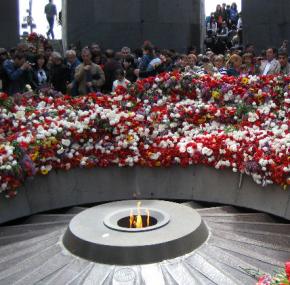Truth is the way to peace
is a faculty member in the School of Public Health at the University of Washington. Her grandparents fled the Armenian genocide to come the U.S. in the early 1900s. She is in Istanbul this week attending the World Federation of Public Health Associations, and later plans to journey to Iraq.
Here, she writes about President Obama's disappointing statement about the genocide last week.
APRIL 24, 2009, marked the 94th anniversary of the killing of 1.5 million Armenians by the Ottoman Turkish Empire in what is now eastern Turkey and western Armenia. Whether (or not) these systematic and brutal killings should be called a "genocide" is debated with a straight face, and the Armenian diaspora looked eagerly to President Obama to see if he would use the "g word."
Previous U.S. presidents have failed to use the term "genocide" because Turkey's denial of the events is absolute, and we didn't want to offend. As Turkey is such an important strategic ally, pointing out the past shames of a host of American military operations at the crossroads of Europe and the Middle East seemed a rather unstrategic move.
Obama did use the "g word" as a U.S. senator: "I...share with Armenian Americans--so many of whom are descended from genocide survivors--a principled commitment to commemorating and ending genocide. That starts with acknowledging the tragic instances of genocide in world history." (January 19, 2008)

This year, Obama's statement stopped short: "Ninety-four years ago, one of the great atrocities of the 20th century began. Each year, we pause to remember the 1.5 million Armenians who were subsequently massacred or marched to their death in the final days of the Ottoman Empire. The Meds Yeghern must live on in our memories, just as it lives on in the hearts of the Armenian people." (April 24, 2009)
Armenians made the pilgrimage on Friday to the Armenian Remembrance Memorial in the hills of Yerevan, where the eternal flame burns to commemorate all those who perished at the hands of the Turks. I was privileged this year to be one among the hundreds of thousands in the crowd that flowed continually through the memorial. Video of the events was broadcast on television all day long, and the national holiday led to the closure of all government offices and many business.
Armenia is about nine hours ahead of Washington, D.C., and as day dawned in the U.S. capital, we all were waiting to see what statement the president would issue. There was clear disappointment that the "genocide" word was not used, but people were intrigued by his use of the Armenian phrase, "Meds Yeghern," interpreted here to mean "The Great Massacre," and to refer specifically to the events of 1915.
People are grudgingly willing to give Obama a pass this year. As new negotiations between the Turkish and Armenian governments were just announced this month, there is some hope that relations can be normalized between the two governments.
Armenia is not likely to agree to normalization, however, unless there is acknowledgment by the Turkish government of the events of 1915. A new book published this year in Istanbul, Murat Bardakci's The Remaining Documents of Talat Pasha, revealed a long-hidden document that belonged to the interior minister of the Ottoman Empire, giving the number of 972,000 Ottoman Armenians who disappeared from official population records from 1915 through 1916.
Numbers like that are hard to comprehend. Intriguingly, it's a number similar to the one named by academic epidemiologists in The Lancet (Lancet 2006; 368: 1421-28) as a count of people who have died in conflict-related violence in Iraq since the 2003 U.S. invasion.
Denial doesn't erase history. Atrocities must be acknowledged, and people on all sides should truthfully reconcile. That is the way to peace.


